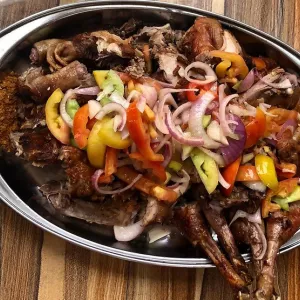First-ever guidelines to help African governments improve food safety in informal food markets to be developed
New guidelines to support African governments to improve food safety across the continent’s vast informal food sector are set to be developed for the first time. The African Union (AU) and the International Livestock Research Institute (ILRI) have joined forces to produce the first framework for addressing the unique challenges faced by a vital but often overlooked informal food sector.

First-ever guidelines to help African governments improve food safety in informal food markets to be developed
New guidelines to support African governments to improve food safety across the continent’s vast informal food sector are set to be developed for the first time.
The African Union (AU) and the International Livestock Research Institute (ILRI) have joined forces to produce the first framework for addressing the unique challenges faced by a vital but often overlooked informal food sector.
Africa’s informal sector is critical for food security, employment, and livelihoods, particularly for the continent’s urban poor.
Roughly 70% of Africa’s urban households buy food from informal markets, which includes street vendors, kiosks, and traditional market sellers, among others.
However, food safety in Africa’s domestic markets, including informal markets, has been historically neglected, or mismanaged. Some 90 million Africans become sick from foodborne illness every year, costing an estimated USD 16 billion in productivity losses. In comparison, the international community invests just USD 55 million per year in food safety projects on the continent.
The new guidelines seek to reflect the realities of African food systems to improve the ways in which African governments engage with the informal sector in their efforts to improve the safety of foods.
Embracing and engaging with the informal food sector as a cornerstone of food systems transformation is likely to play a key role in the post-Malabo agenda.
The guidelines are informed by ILRI’s research and interventions towards improved food safety across Africa.
The AU and ILRI will consult with informal sector actors and partners to help refine the guidelines. The consultation process with member states will continue until 2025 when the framework will be presented to the AU policy bodies for approval.
Photo: Chicken on sale at a market in Ouagadougou, Burkina Faso (ILRI/Michel Dione)

